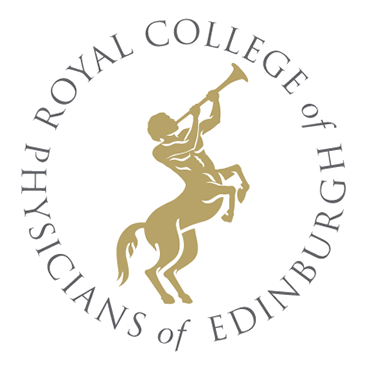
The Consultation Letters of Dr William Cullen (1710-1790) at the Royal College of Physicians of Edinburgh
[ID:85] From: Dr William Cullen (Professor Cullen) / To: Mr Thomas Duncanson / Regarding: Mrs Falconer (Patient) / 21 March 1770 / (Outgoing)
Reply, 'For Mrs Falconer', to Thomas Duncanson, giving a prescription for treating her "Schirrhus of the Breast". Apparently signed by Cullen's brother-in-law, William Almack, without explanation – possibly relating to a scribal role.
- Facsimile
- Normalized Text
- Diplomatic Text
- Metadata
- Case
- People
- Places
Facsimile
There are 4 images for this document.
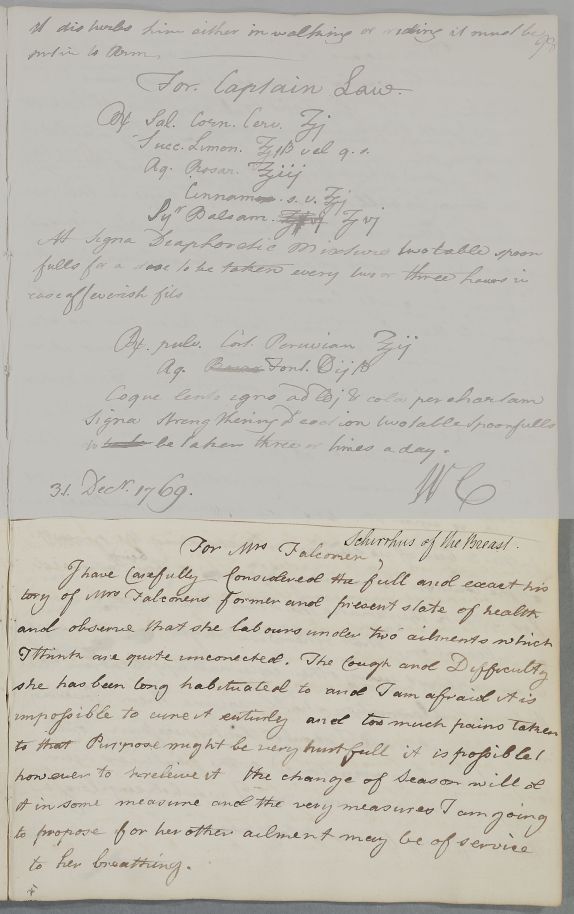
[Page 1]
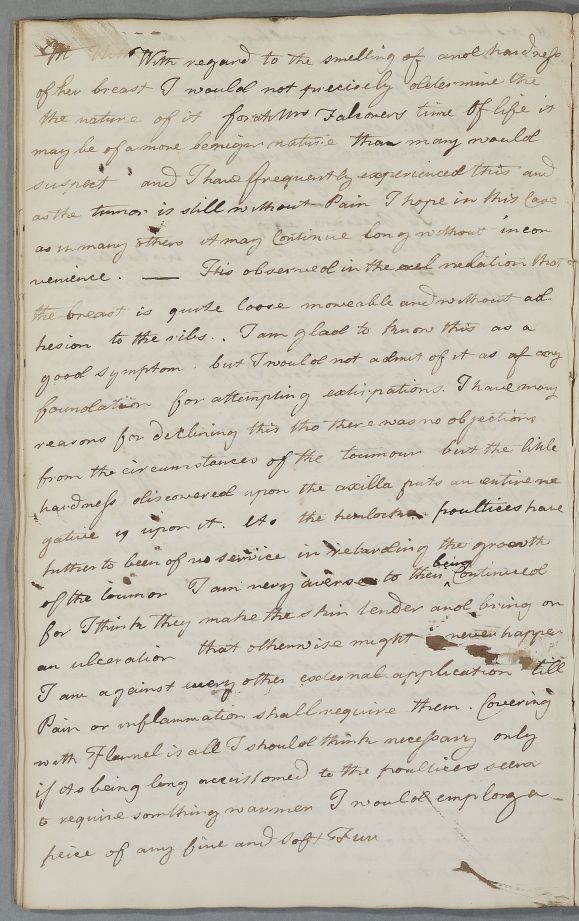
[Page 2]
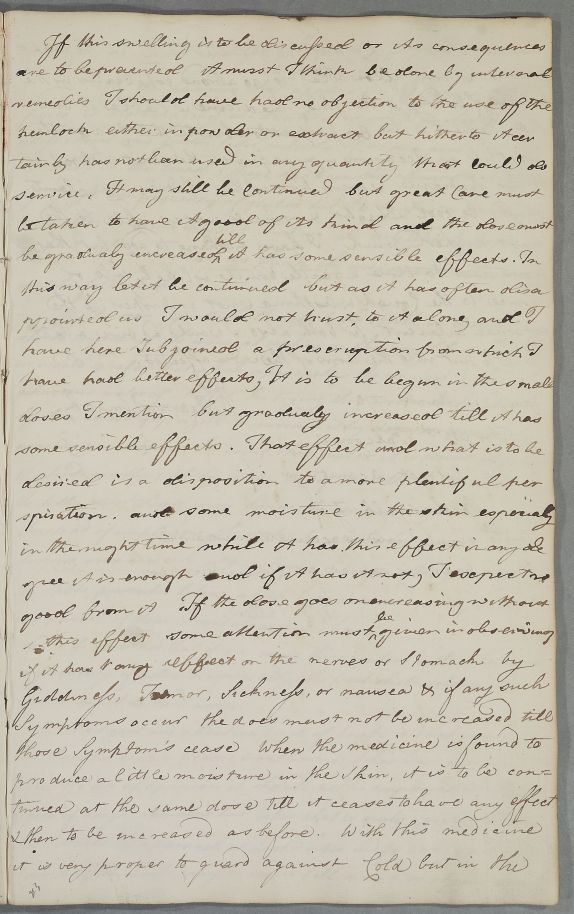
[Page 3]
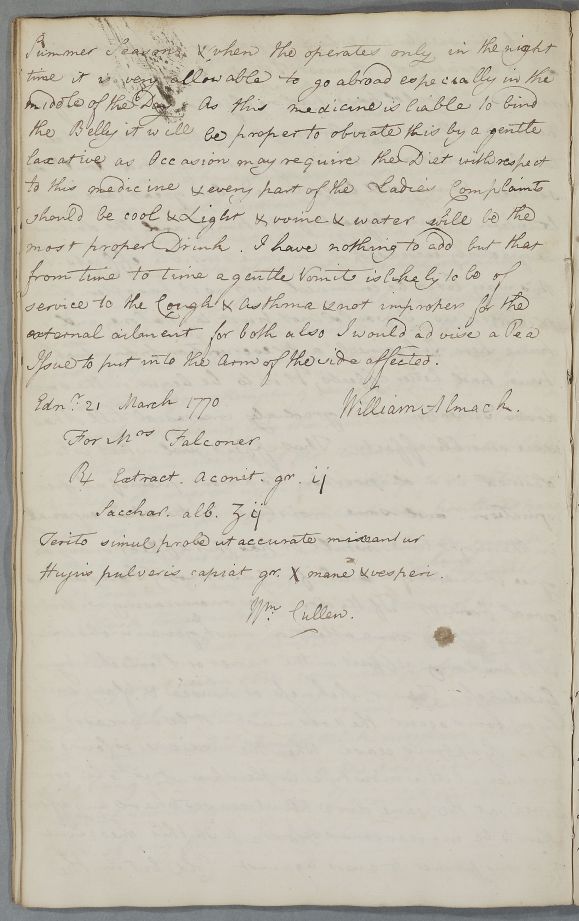
[Page 4]
Metadata
| Field | Data |
|---|---|
| DOC ID | 85 |
| RCPE Catalogue Number | CUL/1/1/1/80 |
| Main Language | English |
| Document Direction | Outgoing |
| Date | 21 March 1770 |
| Annotation | None |
| Type | Scribal copy ( includes Casebook Entry) |
| Enclosure(s) | No enclosure(s) |
| Autopsy | No |
| Recipe | Yes |
| Regimen | No |
| Letter of Introduction | No |
| Case Note | No |
| Summary | Reply, 'For Mrs Falconer', to Thomas Duncanson, giving a prescription for treating her "Schirrhus of the Breast". Apparently signed by Cullen's brother-in-law, William Almack, without explanation – possibly relating to a scribal role. |
| Manuscript Incomplete? | No |
| Evidence of Commercial Posting | No |
Case
Cases that this document belongs to:
| Case ID | Description | Num Docs |
|---|---|---|
| [Case ID:17] |
Case of Mrs Falconer, with a "Schirrhus of the Breast". |
2 |
People linked to this document
| Person ID | Role in document | Person |
|---|---|---|
| [PERS ID:1] | Author | Dr William Cullen (Professor Cullen) |
| [PERS ID:1564] | Addressee | Mr Thomas Duncanson |
| [PERS ID:331] | Patient | Mrs Falconer |
| [PERS ID:1564] | Patient's Physician / Surgeon / Apothecary | Mr Thomas Duncanson |
| [PERS ID:1] | Patient's Physician / Surgeon / Apothecary | Dr William Cullen (Professor Cullen) |
| [PERS ID:619] | Other | Mr William Almack |
Places linked to this document
| Role in document | Specific Place | Settlements / Areas | Region | Country | Global Region | Confidence |
|---|---|---|---|---|---|---|
| Place of Writing | Cullen's House / Mint Close | Edinburgh | Edinburgh and East | Scotland | Europe | certain |
| Destination of Letter | Forres | East Highlands | Scotland | Europe | inferred |
Normalized Text
For Mrs Falconer,
I have carefully considered the full and exact his¬
tory of Mrs Falconers former and present state of health
and observe that she labours under two ailments which
I think are quite unconected. The Cough and Difficulty
she has been long habituated to and I am afraid it is
impossible to cure it entirely and too much pains taken
to that Purpose might be very hurtfull it is possible I
however to rereleive it the change of Season will at
it in some measure and the very measures I am going
to propose for her other ailment may be of service
to her breathing.
[Page 2]
With regard to the swelling of and hardness
of her breast I would not precisely determine the
the nature of it for at Mrs Falconers time of life it
may be of a more benign nature than many would
suspect and I have frequently experienced this and
as the tumor is still without Pain I hope in this case
as in many others it may continue long without incon¬
venience. -- This observed in the exel [relation?] that
the breast is quite loose moveable and without ad¬
hesion to the ribs. I am glad to know this as a
good symptom, but I would not admit of it as of any
foundation for attempting extirpations. I have many
reasons for declining this tho there was no objections
from the circumstances of the toumour but the little
hardness discovered upon the axilla puts an entire ne¬
gative u upon it. As the hemlock poultices have
further to been of no service in retarding the growth
of the toumor I am very adverse to their ↑being↑ continued
for I think they make the skin tender and being on
an ulceration that otherwise might never happen
I am against every other external application till
Pain or inflammation shall require them. Covering
with Flannel is all I should think necessary only
if its being long accustomed to the poultices seem
to require something warmer I would employ a
peice of any fine and soft Fur
[Page 3]
If this swelling is to be discussed or as consequences
are to be prevented it must I think be done by internal
remedies I should have had no objection to the use of the
hemlock either in powder or extract but hitherto it cer¬
tainly has not been used in any quantity that could do
service. It may still be continued but great care must
be taken to have it good of its kind and the dose must
be gradualy increased ↑till↑ it has some sensible effects. In
this way let it be continued but as it has often disa¬
ppointed us I would not trust to it along and I
have here Subjoined a prescription from which I
have had better effects, It is to be begun in the small
doses I mention but gradualy increased till it has
some sensible effects. That effect and in fact is to be
desired is a disposition to a more plentiful per¬
spiration. and some moisture in the skin especialy
in the night time while it has this effect in any de¬
gree it is enough and if it has it not, I expect no
good from it If the dose goes on encreasing without
this effect some attention must ↑be↑ given in observing
if it has t any effect on the nerves or Stomach by
Giddiness, Tumor, Sickness, or nausea & if any such
Symptoms occur the does must not be increased till
those Symptom's cease when the medicine is found to
produce a little moisture in the Skin, it is to be con¬
tinued at the same dose till it ceases to have any effect
& then to be increased as before. With this medicine
it is very proper to guard against Cold but in the
[Page 4]
Summer Season & when She operates only in the night
time it is very allowable to go abroad especially in the
middle of the Day as this medicine is liable to bind
the Belly it will be proper to obviate this by a gentle
laxative as Occasion may require the Diet with respect
to this medicine & every part of the Ladies Complaints
should be cool & Light & wine & water will be the
most proper Drink. I have nothing to add but that
from time to time a gentle Vomit is likely to be of
service to the Cough & asthma & not improper for the
external ailment for both also I would advise a Pea
Issue to put into the arm of the side affected.
Take two grains of aconite extract and two drachms of white sugar. Rub them together thoroughly so that they are properly mixed. Of this powder, let her take ten grains in the morning and evening.
Notes:
1: The placing of this name here in the case-book is puzzling. The London club-owner William Almack (d. 1781), a former valet to the Duke of Hamilton, was Cullen's brother-in-law, having married his sister Elizabeth, the Duchess's lady-in-waiting, on 16 May 1752, at St George's, Mayfair. The current (August 2013) DNB article on Almack states that by this date he was married to Cullen's niece Elizabeth but the evidence indicates this is an error. Various conjectures arise as to why his name appears under this entry in the case-book: the letter may have been directed to him for forwarding or he may have even been visiting Edinburgh and, temporarily assisting as Cullen's scribe, signed this case-book entry (comparison with Almack's handwriting in Letter ID:2864 is inconclusive).
Diplomatic Text
For Mrs Falconer,
I have carefully considered the full and exact his¬
tory of Mrs Falconers former and present state of health
and observe that she labours under two ailments which
I think are quite unconected. The Cough and Difficulty
she has been long habituated to and I am afraid it is
impossible to cure it entirely and too much pains taken
to that Purpose might be very hurtfull it is possible I
however to rereleive it the change of Season will at
it in some measure and the very measures I am going
to propose for her other ailment may be of service
to her breathing.
[Page 2]
With regard to the swelling of and hardness
of her breast I would not precisely determine the
the nature of it for at Mrs Falconers time of life it
may be of a more benign nature than many would
suspect and I have frequently experienced this and
as the tumor is still without Pain I hope in this case
as in many others it may continue long without incon¬
venience. -- This observed in the exel [relation?] that
the breast is quite loose moveable and without ad¬
hesion to the ribs. I am glad to know this as a
good symptom, but I would not admit of it as of any
foundation for attempting extirpations. I have many
reasons for declining this tho there was no objections
from the circumstances of the toumour but the little
hardness discovered upon the axilla puts an entire ne¬
gative u upon it. As the hemlock poultices have
further to been of no service in retarding the growth
of the toumor I am very adverse to their ↑being↑ continued
for I think they make the skin tender and being on
an ulceration that otherwise might never happen
I am against every other external application till
Pain or inflammation shall require them. Covering
with Flannel is all I should think necessary only
if its being long accustomed to the poultices seem
to require something warmer I would employ a
peice of any fine and soft Fur
[Page 3]
If this swelling is to be discussed or as consequences
are to be prevented it must I think be done by internal
remedies I should have had no objection to the use of the
hemlock either in powder or extract but hitherto it cer¬
tainly has not been used in any quantity that could do
service. It may still be continued but great care must
be taken to have it good of its kind and the dose must
be gradualy increased ↑till↑ it has some sensible effects. In
this way let it be continued but as it has often disa¬
ppointed us I would not trust to it along and I
have here Subjoined a prescription from which I
have had better effects, It is to be begun in the small
doses I mention but gradualy increased till it has
some sensible effects. That effect and in fact is to be
desired is a disposition to a more plentiful per¬
spiration. and some moisture in the skin especialy
in the night time while it has this effect in any de¬
gree it is enough and if it has it not, I expect no
good from it If the dose goes on encreasing without
this effect some attention must ↑be↑ given in observing
if it has t any effect on the nerves or Stomach by
Giddiness, Tumor, Sickness, or nausea & if any such
Symptoms occur the does must not be increased till
those Symptom's cease when the medicine is found to
produce a little moisture in the Skin, it is to be con¬
tinued at the same dose till it ceases to have any effect
& then to be increased as before. With this medicine
it is very proper to guard against Cold but in the
[Page 4]
Summer Season & when She operates only in the night
time it is very allowable to go abroad especially in the
middle of the Day as this medicine is liable to bind
the Belly it will be proper to obviate this by a gentle
laxative as Occasion may require the Diet with respect
to this medicine & every part of the Ladies Complaints
should be cool & Light & wine & water will be the
most proper Drink. I have nothing to add but that
from time to time a gentle Vomit is likely to be of
service to the Cough & asthma & not improper for the
external ailment for both also I would advise a Pea
Issue to put into the arm of the side affected.
℞ Extract. aconit. gr ij
Sacchar. alb. ʒij
Terito simul probe ut accurate misceantur
Hujus pulveris capiat gr. X mane & vesperi.
Notes:
1: The placing of this name here in the case-book is puzzling. The London club-owner William Almack (d. 1781), a former valet to the Duke of Hamilton, was Cullen's brother-in-law, having married his sister Elizabeth, the Duchess's lady-in-waiting, on 16 May 1752, at St George's, Mayfair. The current (August 2013) DNB article on Almack states that by this date he was married to Cullen's niece Elizabeth but the evidence indicates this is an error. Various conjectures arise as to why his name appears under this entry in the case-book: the letter may have been directed to him for forwarding or he may have even been visiting Edinburgh and, temporarily assisting as Cullen's scribe, signed this case-book entry (comparison with Almack's handwriting in Letter ID:2864 is inconclusive).
XML
XML file not yet available.
Feedback
Send us specfic feeback about this document [DOC ID:85]
Please note that the Cullen Project team have now disbanded but your comments will be logged in our system and we will look at them one day...

